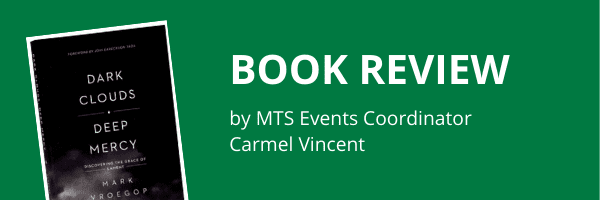Dark Clouds, Deep Mercy by Mark Vroegop

It is an inescapable fact that we live in a fallen world full of brokenness and sin in which suffering, pain and sorrow touch us and those we love in a myriad of ways. Until Christ returns or calls us home, Mark Vroegop shows us in “Dark Clouds, Deep Mercy”, that lament is how, in faith, we should turn to God when the dark clouds come, trusting in his goodness and experiencing his deep mercy. To cry is universal but to lament is Christian – it is a prayer in pain that leads to trust and God-centred worship. It is how we bring our sorrows to God while trusting in His goodness. It deepens our understanding of God’s grace and empowers us to be conduits of that grace.
In the first section of his book, Vroegop uses four lament psalms to teach us each step in how to lament – turning to God in prayer; bringing our complaints; asking boldly; and choosing to trust.
In part 2 he works through the book of Lamentations to show us what lament can teach us. Lament allows us to hear the lessons God intends to teach us through pain – about the brokenness of the world and the holiness of God; about God’s faithfulness and never-ending mercies; about the truth of God’s promises and how to find hope even in the greatest pain.
In Part 3 Vroegop explores how to live with and practice lament, both personally and with others.
The reflection questions at the end of each chapter are helpful tools enabling the reader to think more deeply on their own life and the Bible – these could be done alone or as part of a reading group.
Vroegop discovered the grace of lament through his own experience of loss and grief and God, in his kindness, has used him to write a profound, Biblical and hope-filled book that would benefit all Christians. It is easy to read (despite the at times heavy subject matter) as Vroegop engagingly combines his personal and pastoral experience with Biblical exposition. Whether you are suffering yourself, supporting someone who suffers, or wish to be better prepared when one of those situations arises (as it inevitably will), I cannot recommend this book highly enough.
